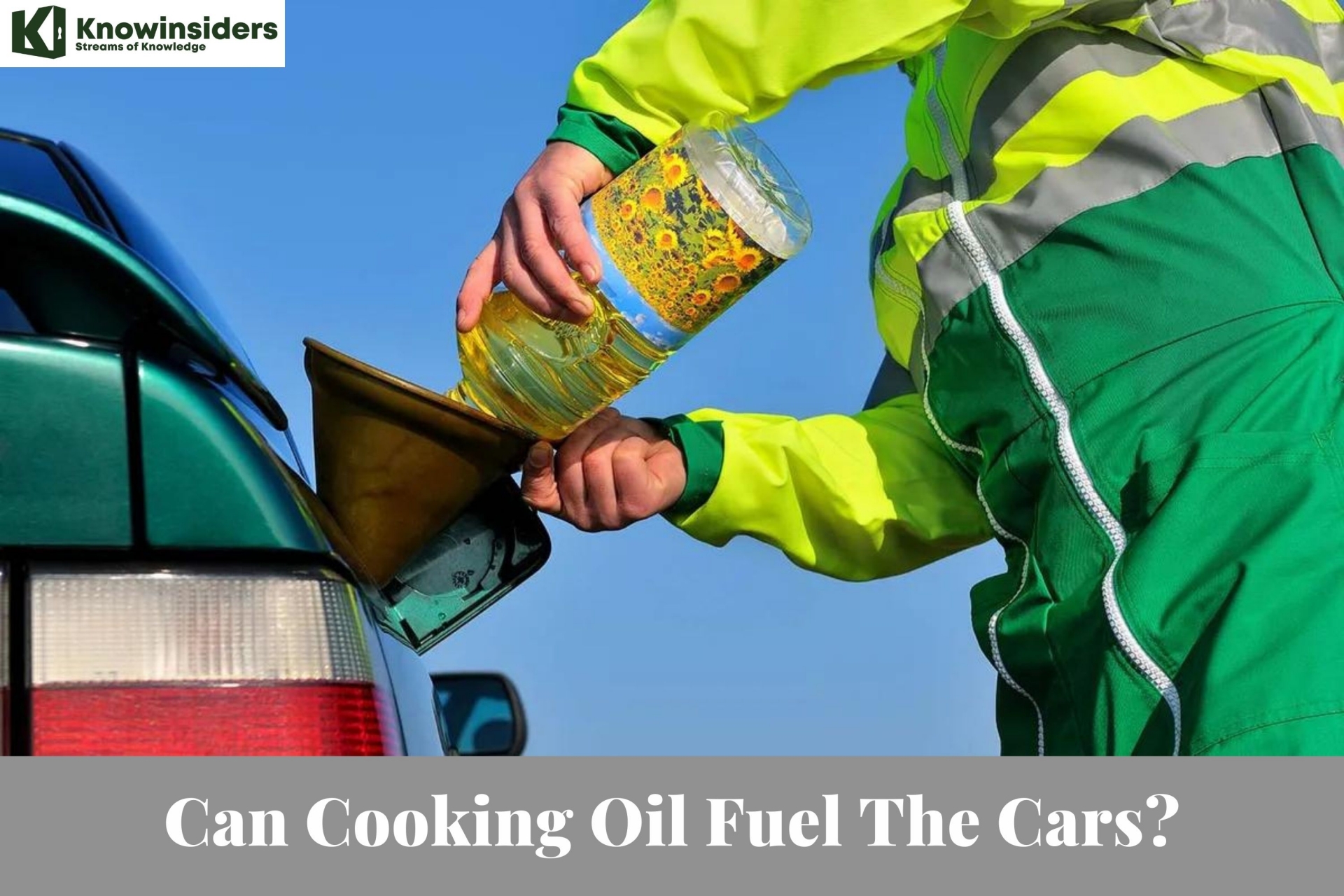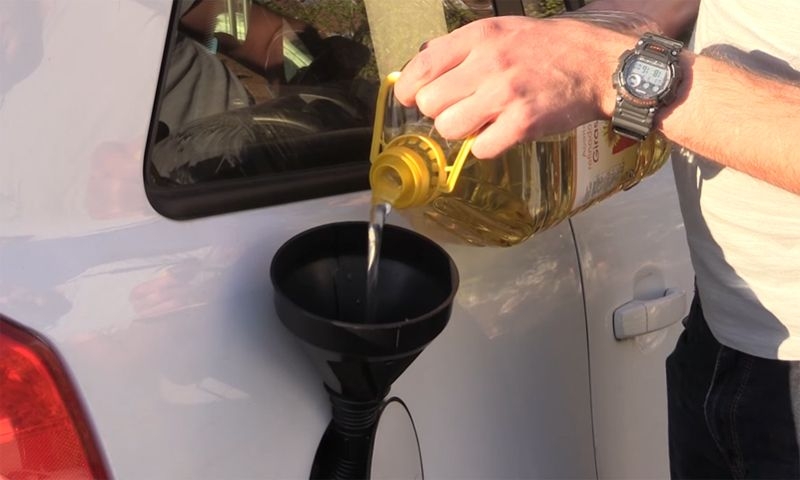Fact-Check: Use Cooking Oil to Fill Up The Car As Gas Prices Surge
 |
| Can Cooking Oil Fuel The Cars? |
| Table Content |
It is quite strange that many people in the US now want to use vegetable oil as fuel in their cars. This is easy to find because most restaurants will throw away excess vegetable oil when the food is done. Many people have contacted local eateries to take back the excess oil batches.It would be great if we could find new fuel to power our cars - something that would help us go longer distances without spending a lot of money. What if people used some common and easily available substance for fuel?
Of course, you won't be able to put vegetable oil in your car and drive away. It will damage the car engine. However, with a few tweaks, you can make the car work. To do this, we need to distinguish between vegetable oils used as fuel and biodiesel.
Biodiesel is a type of fuel derived from vegetable sources, often soy, but it is refined at a special facility that must follow antipollution laws and other fuel regulations. Many vehicles with diesel engines can run on biodiesel or a blend of biodiesel and petroleum diesel without much modification [source: National Biodiesel Board].
Using vegetable oil to fuel a vehicle is an entirely different matter. You're basically using the vegetable oil you can buy at the supermarket (or get for free from a restaurant) as fuel. It's more of a do-it-yourself type of alternative fuel. There's no refining process and it isn't regulated or tested according to environmental laws.
In fact, using vegetable oil as fuel could be illegal in some states, as state and federal revenue agents in the U.S. require special licenses to drive converted cars, as well as payment of motor fuel taxes. Vegetable oil also isn't considered a great fuel source for long-term use.
Is Biodiesel Good Fuel?
If your vehicle has a diesel engine, then it can burn biodiesel made from used cooking oil without needing any engine modifications. By itself, however, pure vegetable oil is not a viable fuel and is much more viscous than diesel. In short, this means that it’s thicker and stickier than diesel, so it doesn’t flow as cleanly and will give the engine a hard time burning it all effectively. Pure vegetable oil can then build up in the engine, interfering with the flow of fuel and leading to stalling or burnout.
What’s the difference between vegetable oil and biodiesel?
Chemically speaking, vegetable oil and biodiesel are close relations. Biodiesel is veggie oil with the glycerin content taken out. To be called biodiesel, there’s also a group of standards the fluid has to meet. Cooking oil doesn’t meet these standards, so can’t be referred to as a biofuel.
According to Oileco, one of the biggest buyers of waste cooking oils in the country, biodiesel burns 88% cleaner than regular diesel. By using WVO, you’re driving greener. This is the thing Mcdonald's, that geographically ubiquitous restaurant chain, undeniably gets a gold star for.
In its bid to ‘make the world a better place’, it recycles its cooking oil and fuels its own commercial vans with it. Many other businesses do similar, helping them hit sustainability targets. However, unless you have high quantities of waste oil like Mcdonald's, it’s not especially cost-effective.
Can you fill up your car with vegetable oil?
 |
| Photo: choosesq |
Firstly, you can only use vegetable oil in a diesel engine, not a petrol one.
It’s important to note though that oil should not be poured directly from the bottle into a car. Due to the oil being so thick and sticky, it won't flow properly through the engine, and it will not burn efficiently. In turn, this will cause the oil to solidify and build up, damaging the engine and causing it to burn out or stall.
However, it is possible to use straight vegetable oil (or SSO as it is known as) as a fuel source, but this is only feasible if you have modified your car to address the viscosity issue – for example, by adding a heat exchanger to preheat the oil, therefore reducing its viscosity and surface tension.
On the other hand, there is also a process which turns cooking oil into an efficient biodiesel called transesterification. However, it's strongly advised that this process is left to the experts. If the chemical compounds are mixed or processed incorrectly, then it can cause a very dangerous and hazardous chemical reaction.
It's believed older diesel engines are more likely to run on cooking oil or even used oil that has been strained. However, again, the viscosity of cold oil can cause fuel injectors to clog.
In contrast, modern diesel engines will need the cooking oil to be enhanced and turned into biofuel.
So, while it is possible if you have a diesel engine, the process is not advised – with plenty of things that could potentially go disastrously wrong.
Of course, alternative fuel is a hot topic at the moment. It was recently confirmed that cars and vans powered wholly by petrol and diesel will not be sold in the UK from 2030.
Video: Watch man fill up his car in Tesco car park (UK) with cooking oil
Use cooking oil to fill up a car, according to Cater OilsCooking oil delivery firm Cater Oils (UK) says recycling vegetable oil into a biodiesel is possible. But on its advice page, the company adds a caveat that people 'really shouldn't' just pour the oil directly from the bottle into their cars, due to it being so thick and sticky. This means it won't flow properly through the engine and it will not be burnt efficiently. This could cause it to solidify and build up, damaging the engine. The process of turning cooking oil into biodiesel, and therefore an efficient source of fuel, is called transesterification. |
Not all cars are equal
Firstly, not all cars can run on straight vegetable oil. Older crappier diesel engine cars are most suitable to run on cooking oil. Petrol-powered cars have a different form of combustion and are thus unsuitable, as the vegetable oils are too flammable for their engines.
A modern diesel engine is most suited to biofuel.
Related: Ways to Make Cooking Oil As Car Fuel: Step By Step
Modifying vegetable oil for use in cars
Firstly, you can change your kitchen oil. It doesn't mean the waste oil you have from last night’s chippy dinner . It meana the clean, unused HVO, straight out of the shop.
Modifying the oil means adding regular diesel to reduce the viscosity of the cooking oil and improve the general performance. While this will work effectively, it’s important to note this method only reduces the amount of clogging, rather than removing that issue altogether. Thus, you’ll still need to replace your filter, which will negate any savings made from thinning the oil out and making your expensive fossil diesel go a bit further.
Converting your diesel engine
Using waste vegetable oil is possible, but the engine needs to be modified and your diesel car now needs two fuel tanks. The first tank uses regular diesel to start the car, the second tank holds the waste cooking oil.
Once the engine is running, heating the WVO reduces the oil’s viscosity—just like it does in the fryer. This helps the oil to flow into the injector and atomize into the combustion chamber in a more efficient way.
It’s not advised you pour dirty oil straight into the tank though. All those tiny black specks from the food you’ve fried sit suspended in the oil and need to be removed, otherwise, they too will cause the engine to clog.
Though contaminants can be filtered using clean fine fabric as a sieve, waste vegetable oil refinement is big business. Worth almost £6 billion globally in 2019, recycling yellow and brown grease from restaurants not only stop our sewer system from being clogged with disgusting fatbergs but also offers an alternative to regular diesel propulsion.
On top of cleaning up the oil and adding the extra fuel tank and lines, you also need other stuff. New fuel injector nozzles with different filtration, specially designed glow plugs, which work for vegetable oil, and some tweaks to your coolant lines, all of which can total over £2,000 for a full conversion.
What are the pros and cons of vegetable oil fuel?
 |
| Photo: postsen |
Pros
• Better for the environment in terms of overall pollution.
• Cheaper than regular fuel.
• Can reduce the reliance on foreign oil, depending on where your country sources its fuels.
• It’s a great talking point at parties.
Cons
• Sourcing enough vegetable oil if you drive a lot could prove difficult.
• The viscosity of cold oil can cause fuel injectors to clog, and it could make your fuel pump work a lot harder, so you’ve gotta strain it. It’s gross, and you’ll see gunk that’s enough to make you question your dietary choices.
• Depending on where you live, your car may still be classed as running on diesel (as it’s not electric) and subject to the usual travel access restrictions.
• It may invalidate your warranty.
• In terms of biodiesel, it’s worth remembering that natural vegetation is destroyed in some parts of the world to grow soybeans and palm oil trees to make biodiesel.
• Growing crops to produce the ingredients for biodiesel diverts farmers from growing food, and uses precious water.
Is Vegetable Oil Worth the Cost?
In terms of financial value, it's almost certainly not. The cost of the engine conversion will be very difficult to recover in fuel savings. On top of that, the cost of vegetable oil is approximately the same as diesel fuel.
Veggie oil might be cheaper depending on where you live or whether you can buy it in bulk from somewhere like a restaurant supply store, but it generally doesn't represent a major cost-saving over petroleum-based fuels.
What about all that talk of getting used vegetable oil for free from restaurants? If you can get your fuel for free, wouldn't that represent huge savings? It would — for now. Veggie oil is used as fuel by a relatively small number of hobbyists who like tinkering with their engines and adjusting their vehicle's fuel ratios.
But make no mistake: The amount of cooking oil discarded by restaurants every day may seem like a lot, but it's nothing compared to the millions of barrels of fuel Americans consume every day. There's no way used vegetable oil could ever become the primary way they fuel our vehicles, and there's even less chance it would ever remain free.
Unfortunately, there's really no way to save money by running on vegetable oil, but there might be other reasons to use it. There are no widespread statistics available for veggie oil mileage rates, but in Consumer Reports' own tests, a car running on biodiesel produced slightly less pollution than the same car running on conventional diesel, but it achieved slightly fewer miles per gallon.
What Cars and Trucks Can Run on Vegetable Oil?
Here are some car and truck models that are good candidates for conversion, some models that have features that could interfere with conversion, and a final list of further suggestions for models that may be converted.
Some examples of suitable cars (this list is not complete)…..
• Audi 80
• BMW 318Tds, 325Tds,525Tds, 725Tds
• Citroen ZX,C15D, Xantia, Berlingo, Jumper
• Fiat Palio, Scudo, Ulysee
• Ford Escort
• Mazda E2200
• Mercedes 190D,200D.250D,330D. C200, C250, 208D, 308D, 408D,508D, VitoD, Kramer
• Mitsubishi Pajero
• Nissan Vanette, Serena
• Peugeot 205, 306, 309, 405, 406, Boxer, Exeprt
• Range Rover
• Seat Toledo, Ibiza, Inca
• Ssangyong Musso D
• Toyota 4-runner, Land Cruiser, HiLux, Hi Ace
• Vauxhall Astra, Serena
• VW Polo, Golf II, Golf III, Jetta, Passatt, Vento, Transporter, Mulitvan, Caravelle, LT, Taro
• Volvo 740D, 760D, 940D, 960D
Volkswagen
Volkswagen has a great reputation for reliability and longevity with their diesel engines. These are the Volkswagens that are recommended for WVO conversions throughout the industry. The earlier models can be found for very little money and will run for a very long time if they are looked after.
Mercedes Benz
Mercedes Benz was also very well known for the robustness of their diesel engines and manufacturing quality. Their cars of this era are blessed by unusually cheap parts and wonderful parts availability.
Ford
These trucks seem to be available everywhere and for very little money. But it can be very hard to find one in good condition; most of them were run into the ground as work trucks. These trucks are not very fast, and they are pretty loud.
Dodge
These trucks are great. The 5.9L Cummins motor is considered the best offered in the U.S. during this time period. They are known as 1,000,000-mile motors due to their longevity.
Planes, trains and moreVegetable oil is not just limited to cars. You can even convert motorbikes and school buses, as long as they feature diesel engines. A test model of an Airbus A380 ‘superjumbo’ aircraft flew from Toulouse to Nice, a three-hour flight. It was the first A380 flight powered by sustainable aviation fuel (SAF) — fuel made from waste oil and fats, green and municipal waste, and non-food crops. The endeavor was a partnership between Air France-KLM, Airbus, airport operator ADP, and energy company Total to make air travel more environmentally friendly. All Airbus aircraft are currently certified to fly with up to a 50% blend of SAF mixed with kerosene. The aim is to achieve certification of 100% SAF by the end of this decade. |
 Top 10 Countries With Biggest Oil Producers And Consumers In The World Top 10 Countries With Biggest Oil Producers And Consumers In The World Oil is one of the most important factors that can affect the economy in the world. In the article below, we will know more about ... |
 Easy Ways to Stop a Squeaky Door with Cucumber, Olive Oil, Soap or Washing-up Liquid Easy Ways to Stop a Squeaky Door with Cucumber, Olive Oil, Soap or Washing-up Liquid To immediately fix a squeak door, you can use something available at home such as cucumbers, cooking oil, bar soap, washing-up liquid etc. |
 Top 10 Largest Oil and Gas Companies in the World Top 10 Largest Oil and Gas Companies in the World Let’s take a look at the list of the top ten highest-earning oil and gas companies in 2021, according to Market Cap. |























